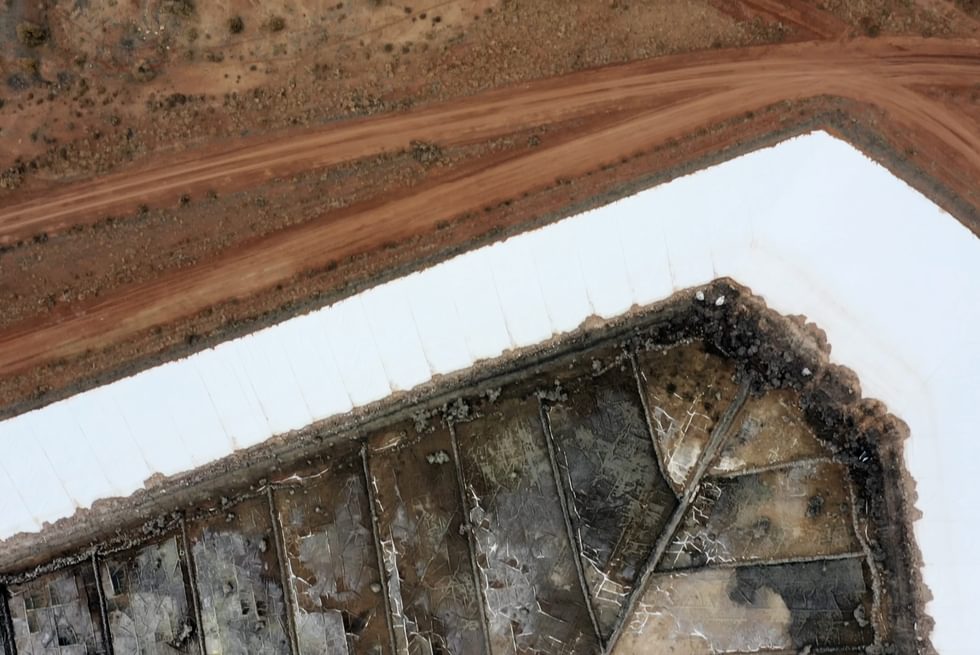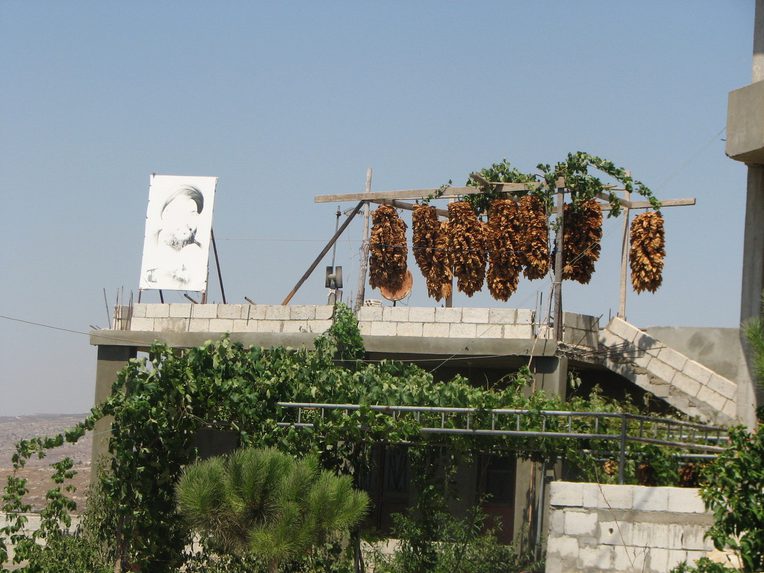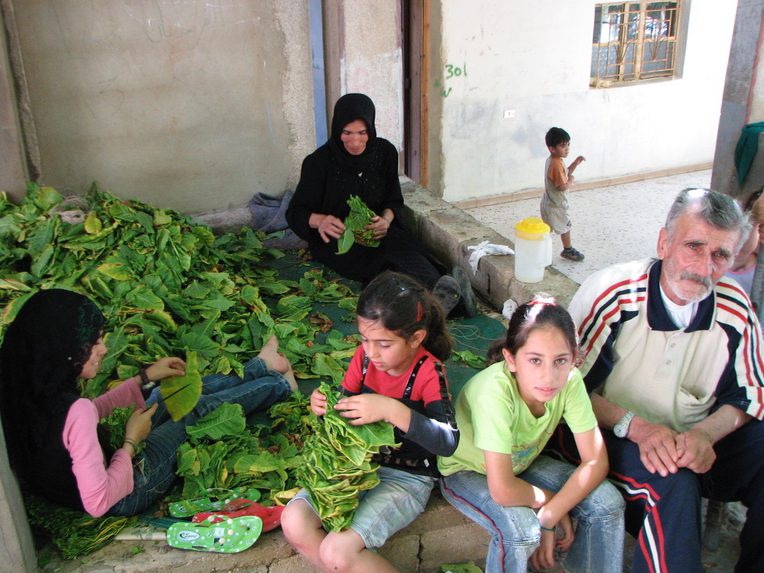Resistant Ecology, Bitter Life
From the Series: Ecologies of War
From the Series: Ecologies of War

In the South Lebanon borderland where tobacco is widely cultivated, locals call it—not unlovingly—al-nabti al-murrah, the “bitter crop.” It is ardently embraced as a resistant and steadfast source of life in a harsh and deadly world. The tobacco plant is an annual dryland crop with a brief efflorescence in high summer that is well-adapted to the hilly topography and arid climate of this landscape that in 1948 became—and remains—a battlefield. South Lebanon has weathered all kinds of war: Israeli aerial assaults and invasions, Palestinian guerrilla warfare, Lebanese resistance, and a twenty-two-year-long Israeli military occupation that ended in 2000. The last conflict to rage here was the 2006 “July War,” during which villages, fields, flocks, and orchards were flattened, killed, and scorched by the Israeli state’s war-machine. Throughout, villagers continue to farm tobacco for the Lebanese state-owned tobacco monopoly, the Regie Libanaise des Tabacs et Tombacs (hereafter Regie). Tobacco farming in South Lebanon allows life to thrive within conditions of poverty, and through seasons of war.
Tobacco is a global market commodity and cash crop carefully cultivated across the homesteads of Lebanese frontline villages. The poor who farm it and the powerful who profit from it are variously invested in its vitalizing qualities: the poor work hard for its reliable if meager income, the powerful easily monopolize its political and economic profits. Through decades of armed conflict in South Lebanon, the tobacco plant, a creature of niche ecology, industrial agriculture, and globalized capitalism has proven its mettle: it is well known for its “resistant” capacity to grow in adversity, not unlike its human cultivators. “Tobacco makes us live (al-dukhan m’ayyashna),” villagers in South Lebanon say. Yet, at the same time that it makes-live, tobacco cultivation remains a bitter lot.

Because of ever-returning seasons of war, inhabitants of South Lebanon rely on risk-averse agricultural processes—resistant ecologies—that require minimal investment, domestic labor, no extra infrastructure, and fast turnover. Unlike citrus, grapes, and olives, tobacco fits the time-space and political economy of war: it is naturally hardy, can be planted anywhere in this rocky, uneven terrain, and it needs no irrigation, thriving off the dew of highland mornings. The relationship of villagers and tobacco is both laborious and intimate. Its workers are the women and children inhabiting village households who tirelessly plant, pluck, thread, and dry the tobacco throughout the spring and summer months, hanging it out to dry in any available space around the home: roofs, gardens, courtyards. They pack the dried tobacco in bales before the first rains of fall and sell it to the Regie in winter: cash flows in during the cold months, once a year. Tobacco provides vital income to the vulnerable demographic inhabiting the frontline villages while also serving the political and economic interests of the ruling class. Lebanese politicians use tobacco licenses to reinforce clientelist networks, and the state barters the Lebanese tobacco crop with multinational tobacco corporations on the global stage for a cut of the Lebanese cigarettes market, which is heavily taxed. Pocketing the proceeds, which are considerable, the Lebanese political elites are making a killing. Dressing kleptocratic profit in nationalist charity, those in power throw a lifeline to those who defend Lebanon’s most deadly and geostrategic front in ways the Lebanese army has been unable to. Tobacco villages retain a Lebanese claim to a landscape otherwise fought over by foreign militaries. Tobacco may be a wretched lifeline, yet it is all that is left to those who refuse to abandon hearth and home in this warzone. Across South Lebanon tobacco is lionized as “the crop of resistance.”
My friend Khawla has worked tobacco her whole life and describes tobacco simply as “my life.” She tells me the following: “Here in the frontline villages, tobacco is the only means of livelihood and hence we have to depend on it. There is no water here, no infrastructure, no support, no alternative! The only viable crop is tobacco.” She repeats the common refrain: “Tobacco is what makes us live.” Khawla and her unmarried sisters planted tobacco throughout decades of war and occupation and it continues to sustain them in the homestead they share with their old parents, the hajj and hajji (the male and female form of an honorific addressing older people who have performed the pilgrimage to Mecca). Tobacco depends on the labor of those who cannot easily enter the urban wage labor market (or fight): the elderly and women and children. It is this demographic that holds on to place while their kin make money (or war) elsewhere. The tobacco farmed, the homesteads kept, the children grown, the kitchen gardens cultivated, the bread baked, and the provisions pickled and preserved by those residing in the villages are vital to (armed) resistance and everyday survival through endless cycles of war.

Tobacco is the sprout of war. As war endures for generations, tobacco is taking over the borderland, becoming the monoculture of South Lebanon. Tobacco unifies the dependence of those it sustains on its munificence, uprooting a wide variety of subsistence and other crops that have also contributed to the staying power of those inhabiting this warzone. Still, in the presence of continual war and the absence of real initiatives addressing rural livelihoods, tobacco militantly thrives. As long as the Lebanese political elite can reap political and economic profit off the resistant labor of Lebanon’s poorest and most battered citizens, they will not change a thing. The farmers too will not budge; they cannot let go of their only lifeline. They have, as they adamantly say, no alternative. Tobacco makes them live.
Like many across the Global South, inhabitants of South Lebanon continue to live amid the fault lines and frictions of violent states at war. Tobacco cultivation enables those it ensnares to somewhat resist hopeless poverty, displacement, and war. Paradoxically, it is clear that the persistence of tobacco farming is generated by the harsh conditions created by capitalism and war. The vital relations that coalesce around tobacco cultivation—a resistant ecology in a perennially unlivable world—holds the tension between devastation and survival. The tension does not resolve. It remains suspended as bitter life.